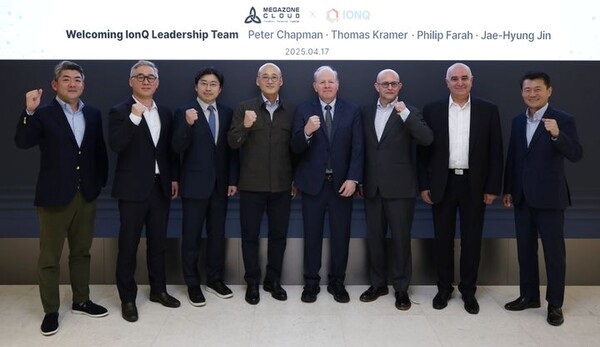South Korea’s largest managed service provider (MSP), MegazoneCloud, is making a bold entry into the quantum computing arena by partnering with major U.S. tech firms. The move is raising expectations that Quantum Computing as a Service (QCaaS) could finally take root in South Korea.
On the 22nd, MegazoneCloud announced a new collaboration with IonQ, a U.S.-based quantum computing company. The partnership aims to deliver IonQ’s quantum computing capabilities to Asian industries via the cloud, effectively launching a quantum business platform across the region. This comes after a memorandum of understanding (MOU) was signed between the two companies in September 2023. MegazoneCloud has already established multiple global partnerships in quantum space. In March last year, the company teamed up with Swiss quantum firm Terra Quantum, and in November, it began supporting Amazon Web Services (AWS)’s quantum service, Braket, for domestic use.
Globally, companies like Google, IBM, and Microsoft have led the quantum charge since the 2010s, investing heavily in R&D. Google further heightened interest last year with the unveiling of its next-generation quantum chip, Willow. However, due to the steep development costs and complex technical barriers, most quantum computing today is accessed via cloud services. Most companies and research institutes use quantum computing through IBM Quantum, Google Quantum AI, Microsoft Azure Quantum, and Amazon Braket.
In South Korea, the quantum computing sector is seen as being in a transitional phase, moving from pure R&D toward industrial application. While the government does offer quantum cloud access to universities and research institutions, commercial-grade QCaaS offerings remain absent.
“Many Korean companies recognize the potential of quantum computing but lack technology strategies,” said Brad Kim, Quantum Executive Officer at MegazoneCloud. “Various forms of quantum computing-based services, including QCaaS, are already being rolled out overseas, but Korean firms have yet to industrialize the technology.”
The potential market is vast. In June 2023, the report by the Electronics and Telecommunications Research Institute (ETRI) estimates that the global quantum technology market, including hardware, software, and services, will reach $106 billion by 2040. The report also forecasts that, because personal or mobile quantum computing is not feasible, cloud-based services will dominate the field. The market is expected to see a significant expansion starting in 2027.
However, hardware technology is necessary to provide quantum computing to the cloud, and Korea is expected to join hands with the U.S. Big Tech, as the technology needed for large-scale quantum computer manufacturing is still in the early R&D stage. ETRI’s report also highlights unresolved physical challenges in operating quantum systems as a major barrier.
For now, Korean MSPs are expected to lean on the expertise of global tech giants. However, this reliance could be a strategic advantage. Through global partnerships, state-of-the-art quantum computing resources and know-how can be quickly introduced and provided to domestic companies and research institutes to increase the practical utilization of quantum technology.
MegazoneCloud plans to apply quantum computing in various industries such as manufacturing, finance, and pharmaceutical development by integrating global resources such as AWS and IonQ on its quantum cloud platform, “M-Qloud,” targeting the Asian market.
An industry expert commented, “With quantum computing now available in the cloud, Korean companies and researchers can overcome previous cost and technical barriers. This approach shields them from the immediate lack of hardware technology.”

As the quantum computing industry remains in its early stages, South Korea’s government and research institutions are closely eyeing the opportunity to leapfrog into a competitive position.
The National Information Society Agency (NIA) noted that while quantum computing services delivered through external cloud platforms are gaining attention, they are not yet as systematically developed as conventional cloud services. “The ecosystem still lacks maturity in areas like service frameworks, software environments, and quantum simulators,” the agency explained. “There are two emerging models: one where companies like Google and IBM offer proprietary quantum environments, and another that supports a variety of quantum systems from third-party providers.”
The Electronics and Telecommunications Research Institute (ETRI) emphasized that quantum computing remains an early-stage market without a clear dominant player. “This creates a strategic opening for South Korea to catch up and secure a foothold in the sector,” the institute assessed.
The government is positioning quantum science as the “rice of future industries” and has upgraded its mid to long-term planning. Last year, it announced the ‘Quantum Science and Technology Vision and Strategy’, committing ₩3 trillion (approx. $2.2 billion) investments through 2035 and developing quantum computing systems and services by 2031.
There have been tangible results. In March, the Korea Institute of Standards and Science (KRISS) and the Korea Institute of Science and Technology (KISTI), Sungkyunkwan University (SKKU), and Ulsan Institute of Science and Technology (UNIST) succeeded in demonstrating a “Quantum Computing System Cloud” that remotely accesses quantum computing through web servers and meets user demand for the first time in Korea.
The research team plans to begin pilot operations in the second half of this year, offering access to selected domestic researchers in the quantum field. By 2026, the system is expected to scale up to 50-qubit-level quantum computing.


